News
Scubaverse Underwater Photographer Interview: Jacopo Brunetti
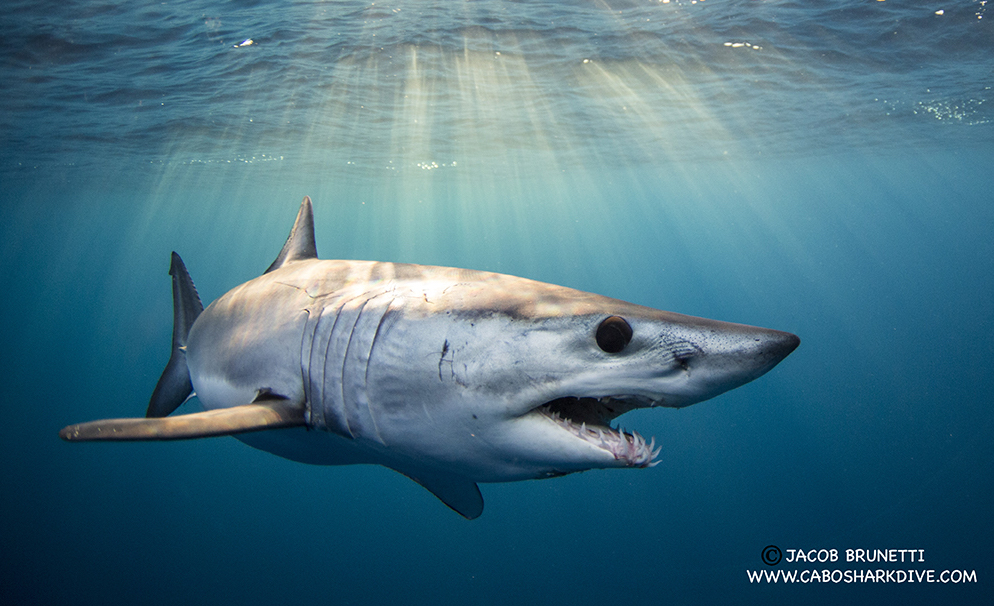
In an ongoing series, Scubaverse.com’s Underwater Photography Editors Nick and Caroline Robertson-Brown talk to underwater photographers from around the world that they admire.
This interview is with Jacopo Brunetti from Cabo Shark Dive.
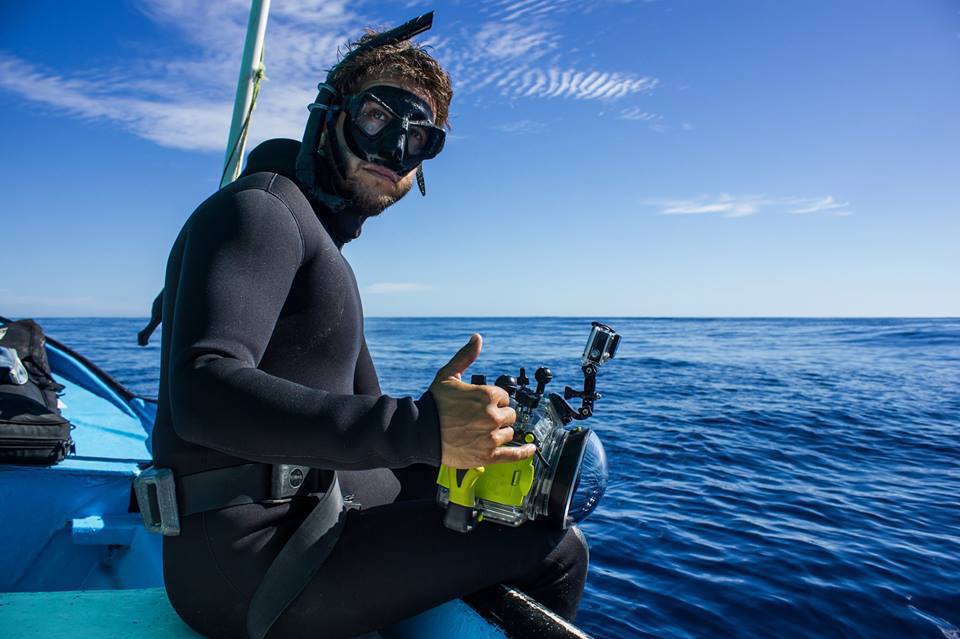
Jacopo Brunetti is the founder of Cabo Shark Dive, the first and only shark diving company in Los Cabos. He is a marine biologist, PADI Scuba Instructor, professional underwater photographer, shark behavioural expert and a big shark addict. For 12 years, Jacopo worked as a biologist, shark dive guide and professional underwater photographer with sharks and large marine animals in South Africa, Egypt, Azores, Hawaii, Mexico, Baja California, Australia & Philippines, collaborating with important institutions such as The Shark Research Lab at The Hawaiian Institute of Marine Biology.
Over the years he gained experience and skills in diving and free diving with big marine animals and he developed an efficient chumming technique to attract sharks safely. He learned how to read and observe the behaviour of sharks and will personally take care of you during your shark experience.
N/C: How long have you been running Cabo Shark Dive? How did it start?
JB: I have run Cabo Shark Dive for the past three years. I was so impressed by the huge pelagic life of Baja and thought that the best way to protect this amazing fauna is to share these wonders and inform as many people as possible about the importance of protecting sharks and other top predators to keep the balance of the ocean.
Cabo Shark Dive has a strong ecological objective. We protect the local species of sharks and pelagic predators by offering the safest, closest and most personal underwater interactions. This is the best way to raise awareness of the conservation of marine environments and encourage more people to love sharks and take part in shark sighting activities. We also promote the development of free diving with sharks as a complementary activity. Shark diving, snorkelling and shark watching are eco-sustainable activities which have no effect on shark populations and other pelagic predators, who are currently in a critical situation. We involve local fisherman in the project, to help the community and nature at the same time. While they work with us they make more money and they don’t kill any fish.
After people have dived with us we as them to do their part, to dispel myths and push shark conservation. Tell others (particularly non-divers) about your experience. Post pictures and videos – focusing on demystifying sharks (not the Jaws type!) Your shark diving experience can really help the ocean.
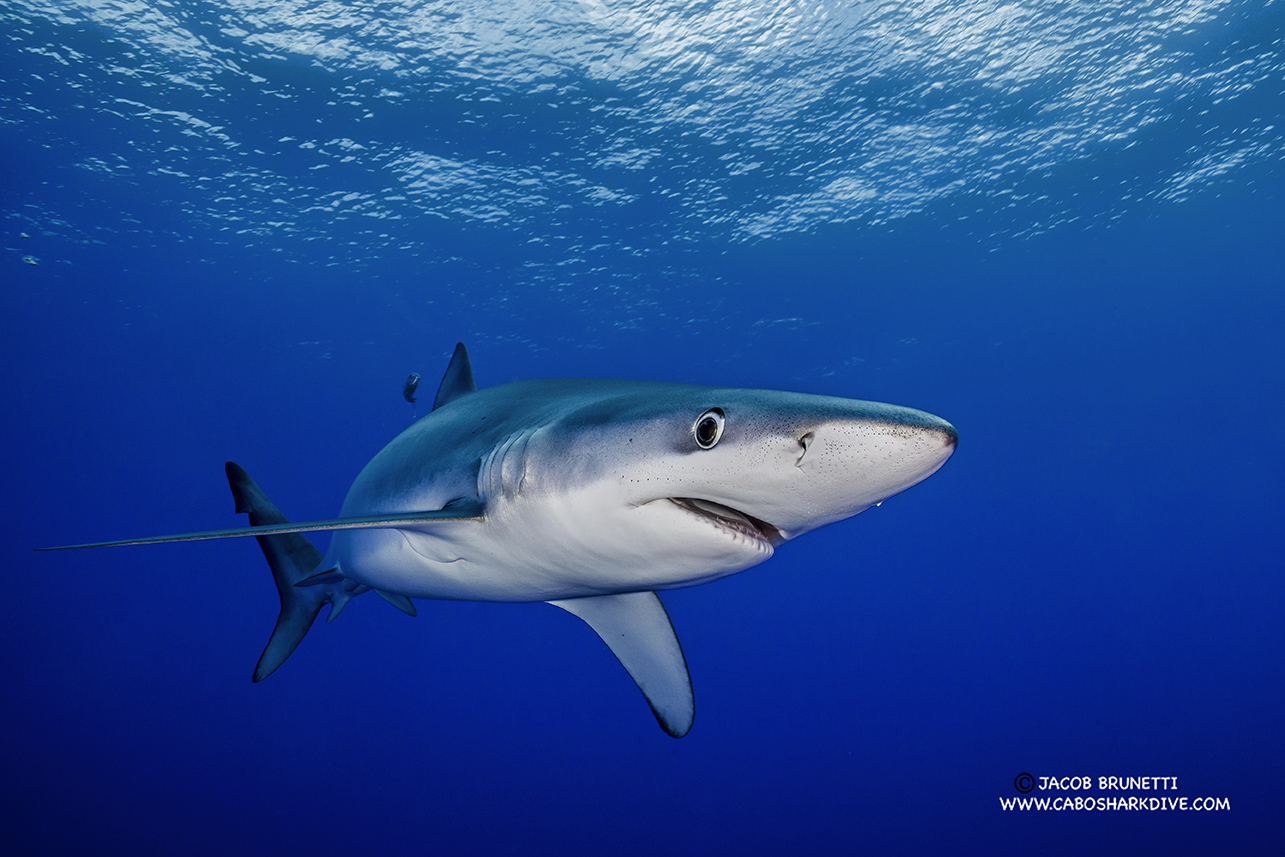
N/C: Do you get a chance to photograph the sharks yourself?
JB: Yes, I’m the head photographer of Cabo Shark Dive.
N/C: What camera equipment do you use?
JB: Nikon d800 or Canon 5d mk3 in a Nautical housing, fish eye lenses.
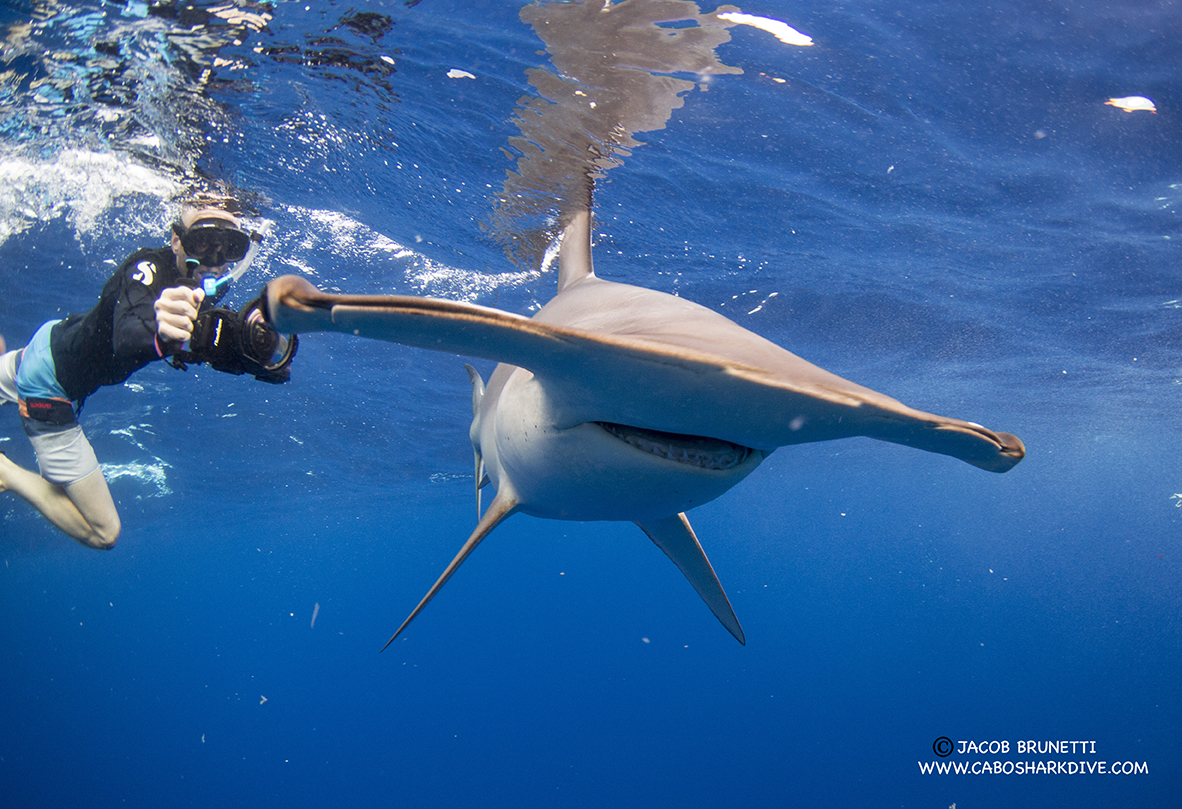
N/C: What is your favourite shark?
JB: Mako and Smooth Hammerhead.
N/C: How do you get your best shark photos? Talk us through what you do to get your best shark shots.
JB: I wait, I float at the surface and I let the sharks get close to me. I try to be invisible in the water, making as few vibrations as possible. I try to merge myself with the water, I move slowly, I slow down my heartbeat and I wait in the right place at the right moment, ready with my finger on the trigger for the perfect shot!
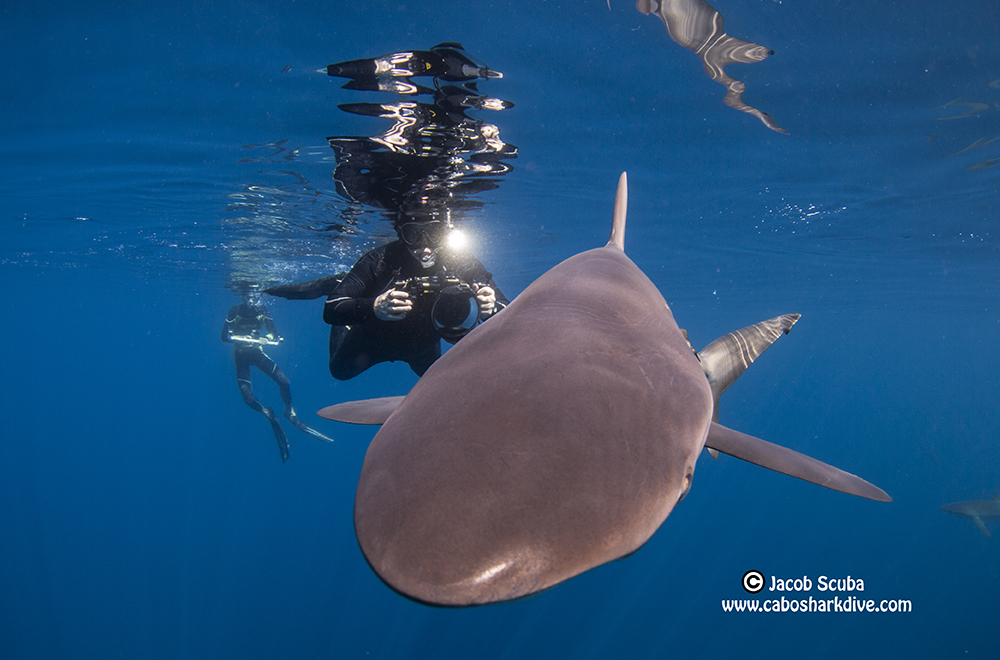
For more from Jacopo and Cabo Shark Dive, click on the following links:
Website: www.cabosharkdive.com
Facebook: jacob brunetti https://www.facebook.com/cabosharkdive/
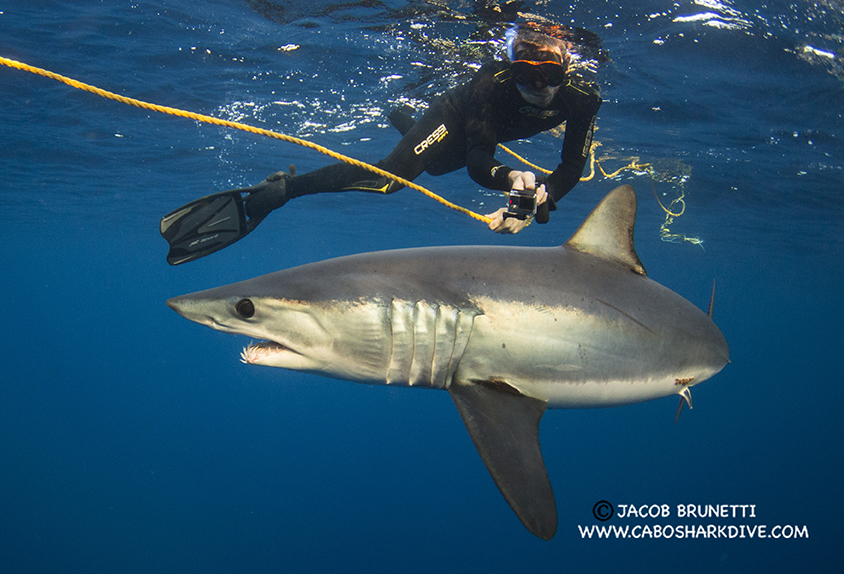
Gear News
Introducing the TR-80, IR-50 and CS-30 Regulators from DYNAMICNORD

Whether you are a beginner or a professional diver – with the three new main regulators from DYNAMICNORD, everyone will find their favourite regulator. They all look super stylish.
Excellent performance with the TR-80
Quality and performance are the be-all and end-all for regulators. It is not for nothing that the TR stands for Tec Reg. The innovative design of the TR-80 guarantees absolute reliability – even in ice-cold waters.

Perfect breathing effort at 0.8 J/l / certified for diving in waters below 10 degrees / structural design made of solid brass for best cold protection / membrane-compensated design with dry seal of the first stage / reduced exhalation effort thanks to optimized exhalation membrane and bubble deflector / adjustable Venturi (dive/predive) and adjustment knob for individual inhalation comfort / innovative design of the front cover prevents free-flow in strong currents or when diving with scooters / design made of sandblasted brass, matt chrome finish / 2 HP and 4 LP outlets / mouthpiece made of high-quality, anti-allergic silicone for maximum comfort.


Amazing underwater adventures with the IR-50
The IR-50 is the top regulator for advanced and experienced divers. Natural breathing is the essence of this regulator.

Ideal breathing effort at 0.8 J/l /certified for diving in waters below 10 degrees / compensated membrane / adjustable venturi (dive/predive) and adjustment knob for individual inhalation comfort/ outlet valve and deflector for minimum exhalation effort and reduction of bubbles on the face / design made of sandblasted brass, matt chrome finish / 2 HP and 4 NP outlets / mouthpiece made of high-quality, anti-allergic silicone for maximum comfort.


The Workhorse – our CS-30
For diving centres and diving beginners – the workhorse stands for strong construction, reliability and robustness. Perfect for your training.

Optimal breathing effort at 0.8 J/l /recommended for diving in waters above 10 degrees / non-compensated piston / adjustable venturi (dive/predive) / outlet valve and deflector for minimum exhalation effort and reduction of bubbles on the face / design made of sandblasted brass, matt chrome finish / 1 HP and 3 NP outlets / mouthpiece made of high-quality, anti-allergic silicone for maximum comfort.


Octopus OP-30
The OP-30 is the ideal addition to all DYNAMICNORD regulators. It is identical in construction to the CS-30.

The TR-80, IR-50, CS-30 (DIN & INT) regulators and the Octopus OP-30 are available from DYNAMICNORD dealers and in the online store.
DYNAMICNORD – Your Outdoor Companion.
Marine Life & Conservation
Paul Watson Released as Denmark Blocks Japan’s Extradition Bid

Renowned anti-whaling activist Paul Watson has been released from custody in Greenland after spending five months in detention. Denmark’s Justice Ministry rejected Japan’s request for his extradition, citing insufficient guarantees that his time already served in custody would be credited against any potential sentence.
The 74-year-old Canadian-American was arrested on July 21 in Nuuk, Greenland’s capital, when his ship docked to refuel. His arrest was based on a 2012 Japanese warrant related to a 2010 encounter in Antarctic waters. Japan alleged Watson obstructed operations and caused damage to a whaling research ship during efforts to disrupt illegal whaling. Watson has consistently denied these claims, maintaining his commitment to marine conservation.
Denmark, which oversees extradition matters for Greenland, concluded that while the legal conditions for extradition were met, the lack of assurances from Japan regarding time-served credit made extradition untenable.
In a video shared by his foundation, Watson expressed gratitude and relief, saying, “After five months, it’s good to be out… and good to know they’re not sending me to Japan.” He added that the most difficult part of his time in custody was being separated from his two young sons.
Watson is a pioneering figure in marine conservation, known for founding the Captain Paul Watson Foundation in 2022 after decades of activism with the Sea Shepherd Conservation Society. His bold efforts to defend marine life have earned him widespread support, including from celebrities and conservationists. His work has also been featured in the acclaimed reality TV series Whale Wars.
Watson’s lawyer, Jonas Christoffersen, praised the decision, stating, “We are happy and relieved that Paul Watson is now free.” He added that Watson is eager to reunite with his family and continue his vital work.
The arrest occurred while Watson’s vessel, the M/Y John Paul DeJoria, was en route to the North Pacific with a team of 26 volunteers to intercept a Japanese whaling ship. His foundation described the arrest as politically motivated and emphasized that Watson’s actions were focused on ending illegal whaling practices.
Japan resumed commercial whaling in 2019 after leaving the International Whaling Commission, asserting that whale meat is a cultural tradition. Conservationists, however, continue to challenge these practices, highlighting their impact on marine ecosystems.
Despite the challenges, Watson remains steadfast in his mission to protect marine life and bring attention to whaling practices. His dedication to ocean conservation has made him a globally respected advocate for the environment.
-

 News2 months ago
News2 months agoIconic SS United States to become the World’s Largest Artificial Reef
-

 News3 months ago
News3 months agoBook Review – 52 Assignments: Underwater Photography
-

 Gear News3 months ago
Gear News3 months agoDYNAMICNORD – New German diving brand enters the British market
-

 News3 months ago
News3 months agoExploring Cenote El Pit: A Diver’s Dream
-

 Gear News3 months ago
Gear News3 months agoTry BARE drysuits (and maybe even win one!) this Friday with Sea & Sea at North West Dive Fest
-

 Marine Life & Conservation3 months ago
Marine Life & Conservation3 months agoBook Review: Coral Triangle Cameos
-

 Blogs2 months ago
Blogs2 months agoDive the Egyptian Red Sea this Autumn with Regaldive
-

 News3 months ago
News3 months ago2024 Ocean Art Underwater Photo Competition Announced















